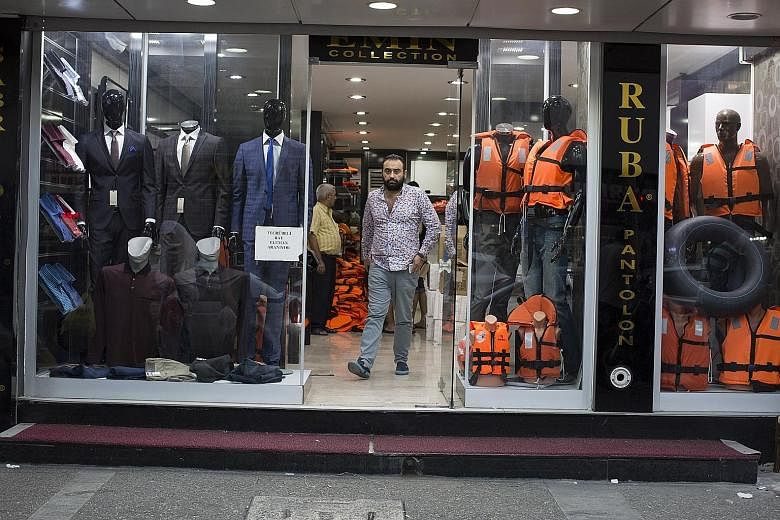IZMIR (Turkey) • For months, Ahmed Abdul-Hamid, a Palestinian from the Syrian city of Aleppo, tried and failed to cross the sea to start a new life in Europe.
The Turkish police detained him. Smugglers tricked him. Once, the motor on his boat stalled and he had to swim back to shore, leaving him stranded and broke.
But his fortunes changed this summer when a Turkish smuggler hired him to recruit passengers from among the refugees and migrants flooding into this port city. Soon, his phone was ringing non-stop with people trying to get to Europe, and the cash was pouring in for him - as much as US$4,000 (S$5,700) per day.
Abdul-Hamid's swift success is a small part of the multimillion-dollar shadow economy that has developed in Turkey to profit from the massive human tide rushing towards Europe.
Much of this new economy is visible in the streets here, where smugglers solicit refugees, clothing stores display life vests and inner tubes, and tour buses and taxis shuttle passengers to remote launch sites along the coast.
Money is flowing through Izmir, the third-largest city in Turkey, now a grim hub for migrants and a boom town for residents. Hidden from view is an extensive smuggling infrastructure, with makeshift "insurance offices" that hold migrants' money, covert factories that churn out ineffective life vests and underground suppliers of cheap rubber rafts that sometimes pop or capsize during the voyage to Greece, stranding or drowning people at sea.
The vast majority of the nearly half-million migrants and refugees who have entered Europe by sea this year have arrived from Turkey, according to the United Nations. And while Europe struggles to respond to the influx, there is no sign that the outflow will wane as long as there is so much money to be made.
If anything, the numbers appear to be growing.
Turkish officials say that they strive to stop illegal outflows and have detained 57,000 travellers and 107 human traffickers this year.
"The Turkish authorities are doing everything in their power to prevent illegal immigration and related casualties," an official said, speaking on the condition of anonymity according to government protocol.
"Instead of pointing fingers, the international community must develop a comprehensive strategy to deal with the situation in Syria."
But here in Izmir, the state appears to be standing by as the daily crush of migrants make their way through the town and to the coast to catch rafts to Greece - an hour-long crossing, if all goes well.
International monitors say that while migrants pump cash into the economy, the biggest winners are well-organised criminal networks that probably pay off the authorities to look the other way.
Most passengers pay US$1,200, and one person selected to pilot each raft rides free. Children go for half price.
Most rafts hold 45 passengers, earning the smugglers a total of over US$50,000. Even after paying commissions, the cost of the boat and motor and bribing officials, smugglers can net more than US$30,000 for each successful crossing, according to Syrians involved in the process.
Boats are the smugglers' essential tool and they have used a variety in their quest to keep costs down. The Greek authorities have intercepted life rafts taken from cruise ships, stolen fishing boats and jet skis carrying two passengers who paid about US$2,250 each, said Mr Antonios Sofiadelis of the Hellenic Coast Guard on Lesbos, where most migrants now land.
But the most common vessels are 9m-long, inflatable black rafts, scores of which leave Turkey every day and whose remains litter Greek beaches. The smugglers often tell passengers to pop the boats with knives if the Greek coast guard approaches to force a rescue and avoid being sent back.
"They are taking the lives of these migrants," said Mr Lado Gvilava, head of the International Organisation for Migration in Turkey.
"They drop them in the middle of the ocean, show them some lights and abandon them in the middle of the sea."
NEW YORK TIMES

